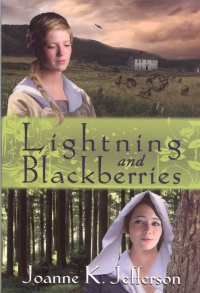| ________________
CM . . .
. Volume XIV Number 21. . . .June 13, 2008 
 |
Lightning and Blackberries.
Joanne K. Jefferson.
Halifax, NS: Nimbus, 2008.
186 pp., pbk., $10.95.
ISBN 978-1-55109-654-4.
Grades 6-9 / Ages 11-14
Review by Betty Klassen.
**½ /4
|
| |
|

excerpt:
By morning a strong west wind hurried little clouds across a brilliant blue sky. I worked beside Sadie tossing hay up onto the high-sided wagon where Mr. Jefferson spread the load. I thought about Marie-Madeleine and her father, remembering the conversations Father and I had had about the departure of the Acadian people. If they all left, I wondered, where did Marie-Madeleine come from and why were she and her father living in the woods behind our farm? I considered what Father would do if he knew about them. My mind was like the clouds, racing before the wind. He would probably insist that they pack up and leave, I thought. Perhaps I should forget I'd ever met them and then they could go on living in their cabin for as long as they needed to. I reasoned that their place was so far from anywhere no one else would notice it. Then I imagined Mr. Jefferson following a grouse through thick woods, carrying a gun.
Elizabeth Evans loves the life she has, taking care of her cows, helping with the gardening, planting, haying, and the apple orchard of her father's successful farm in the Annapolis Valley. She spends a lot of her time working alongside Sadie, the elderly slave woman who has belonged to her mother's family since her mother was a young girl. With Elizabeth's being seventeen years of age, her mother feels it is time for her daughter to give up her interest in farming and start to focus on developing more womanly accomplishments and to think of marriage. Her father, Henry Evans, has many responsibilities as a judge, colonel of the militia, and township treasurer, leaving him little time for working on the farm where he prefers to spend his time. Elizabeth rails against the news that her father has hired a man from Yorkshire who will arrive in time for planting as she does not want a stranger to live and work on her farm.
Lightning and Blackberries is appropriately told in first person from Elizabeth's point of view. At one point, Sadie accuses Elizabeth of not growing up and still thinking everyone in her world should agree with her wishes. Elizabeth's uncompromising attitude creates the conflict we read of which sets her against both her parents, Sadie, the hired man Robert Jefferson, and a few girls from town with whom she occasionally gets together.
After Elizabeth's mother leaves for the summer to visit her family in Sudbury and Boston, Massachusetts, Elizabeth enjoys her summer. The plot reflects the pedestrian pace of farm life in the late 1700's; excitement is added when Elizabeth gets lost in the woods during a severe thunder storm and stumbles upon a small cabin hidden deep in the woods. The occupants, a girl around her own age and the girl's father, speak only French. While the girl, Marie-Madeleine, is happy to help Elizabeth, Marie-Madeleine's father is angry and yells at Elizabeth to leave and never come back.
Marie-Madeleine and Elizabeth strike up a secretive friendship and meet at a large beech tree whenever they can get away from their responsibilities. Their conversation is a mixture of French and English. Any reader not fluent in French will struggle along with Elizabeth to understand everything Marie-Madeleine says.
Meeting Marie-Madeleine piques Elizabeth's curiosity and leads her to question her father about the deportation of the Acadians. She has always wondered why her father was reluctant to broach this subject, and, as she learns more, she sees the farm through enlightened eyes. She then feels that she has no right to stay there and to benefit from the mature apple orchards and the rich farmland surrounded by dykes built by other hands. Throughout the long winter, Elizabeth struggles with her decision whether to stay and farm or leave with her mother to live with her uncle in Massachusetts.
The plot is predictable without any surprising twists, and all of Elizabeth's problems are resolved by the end of the novel. More detailed historical facts woven into the story line would make this novel, set in the late 1700's, truly historical. Another option would be some historical notes at the end.
Recommended.
Betty Klassen teaches in the Faculty of Education in the Middle Years Program at the University of Manitoba in Winnipeg, MB.

To comment
on this title or this review, send mail to cm@umanitoba.ca.
Copyright © the Manitoba Library Association. Reproduction for personal
use is permitted only if this copyright notice is maintained. Any
other reproduction is prohibited without permission.
NEXT REVIEW |
TABLE OF CONTENTS FOR THIS ISSUE
- June 13, 2008.
AUTHORS |
TITLES |
MEDIA REVIEWS |
PROFILES |
BACK ISSUES |
SEARCH |
CMARCHIVE |
HOME |
